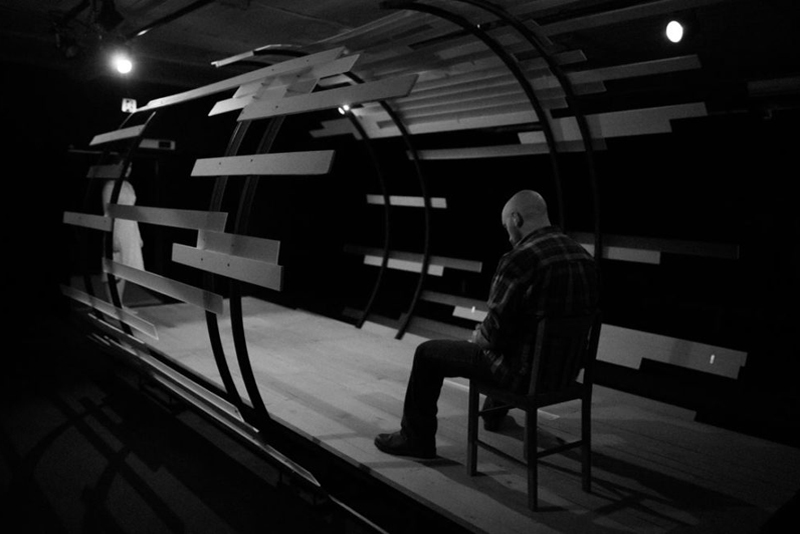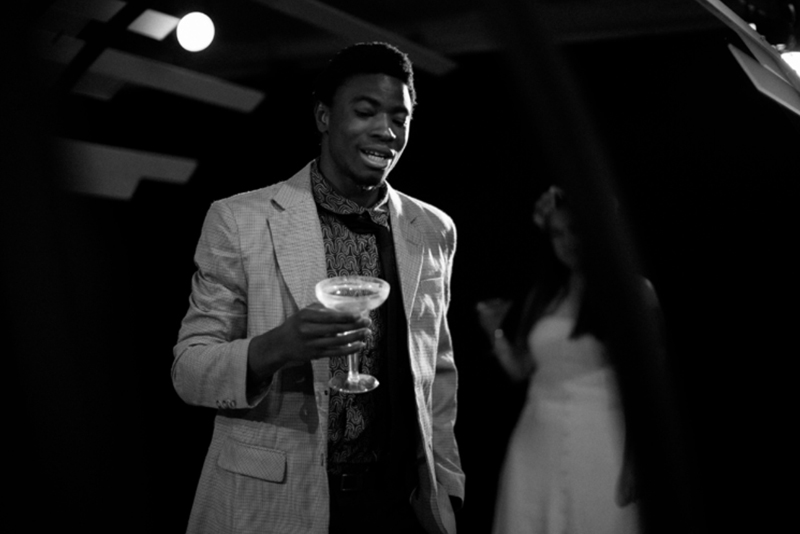Adelaide Festival 2021: Ben Brooker
Ben Brooker at the Adelaide Festival
5 April 2021
Living in Adelaide as I do, it can be easy to forget that there is a global pandemic on. Not for us the slow, devastating burn of case numbers in the millions, death rates at hundreds per day. In Australia, the virus grinds on quietly — a deep, seismic hum beneath the everyday. Periodic eruptions have our premiers reaching for their big levers of state border closures, and our federal politicians doing what they do best — making what should be an evidence-based issue a partisan matter. Fingers wag, invariably in the direction of state Labour governments, as the virus goes about its implacable business, testing the robustness of our quarantine hotels. Now, as ever, the culture wars outstrip reality for vehemence and virulence.
Slowly and cautiously, live theatre – how odd to feel that “live” needs always to be stipulated now among the glut of streamed performance we’ve all been watching (or avoiding) — is returning to our cities. As I write, Perth Fringe, largely undeterred by that city’s five-day hard lockdown in January, is wrapping up after a month. Likewise, this year’s Sydney Festival, despite numerous cancellations and the imposition of social distancing and hygiene measures. The lights are once again on at the Malthouse and Sydney Theatre Company, where Kip Williams’ video-heavy adaptation of The Picture of Dorian Gray, with a reportedly bravura performance by Eryn Jean Norvill at its centre, played to near-universal acclaim from November to January.
In Adelaide, we’re gearing up for what is locally known as “Mad March”— four bacchanalian weeks of arts festivals and events including the Adelaide Festival, Fringe, Writers’ Week, and WOMAD. Despite our low virus case numbers, no festival with an international outlook can open unscathed at the moment, and sure enough, the Festival has already been plagued by cancellations. It remains to be seen how much yet another lockdown in Melbourne, due to be lifted the week I am writing this, will affect the Fringe.

Sam Calleja as Jack in Forgiveness. Photo credit: Johanis Lyons-Reid.
At least two productions have perhaps sensibly gotten in early, prefacing the start of the festival with a short run of shows. The first is Strata/Forgiveness, a double bill of new one-act plays by local indie company RUMPUS which was originally slated to open in September last year but, like so much else, fell victim to the times. The second is Sea Wall, British playwright Simon Stephens’s 2008 monologue about a grief-stricken parent in a production by Flying Penguin Productions, a company known for their sporadic but high-quality offerings of usually English and American drama. All three plays were written pre-Covid, but interestingly it is the oldest, Sea Wall, that most forcibly resonates with the current moment. If they have anything in common it is a preoccupation with loss – in the sense of that word that relates to grief, yes, but also loss of trust, of love, and of the natural world itself.
Of the two one-act plays, Peter Beaglehole’s Strata, which plays first, is unquestionably the more accomplished. Set in a small coastal town and shifting between the near-future of summer 2023 and the recent past of spring and autumn 2016, the plot’s locus is a somewhat unconventional love triangle involving the developer Brody (Max Garcia-Underwood), his sister Robyn (Caithlin O’Loghlen), and Robyn’s fiancée, the refugee Phil (Ben Tamba). As Brody dreams of golf courses and other such Trumpian encroachments on the natural landscape, Robyn and Phil negotiate their upcoming nuptials. But the play, as its name suggests, is a work of many layers. If it is about anything, it is the climate crisis, which hovers unerringly in the background of what might otherwise have been just another relationship drama spiced up by repressed sexuality and infidelity. Even Meg Wilson’s set, a tubular, ribcage-like construction of wood and plastic slats supported by metal rings, suggested to me the skeleton of a whale, victim perhaps of the rapidly warming oceans. In the personal betrayal which drives the play’s drama there is more than a hint of a much larger perfidy – that which has seen the architects of advanced capitalism systematically dismantle our relationship with the earth in search of profit.
Tiffany Lyndall-Knight directs with a sure hand, enlivening this otherwise naturalistic drama with touches of Frantic Assembly—like physical theatre. Garcia-Underwood and O’Loghlen are excellent and are able to carry the night despite an underwhelming performance by Tamba. BeagIehole’s script is witty and blackly humorous, and evinces a real joy in the play of language — a rare thing in a young playwright of the kind whose work is so often subjected to dramaturgical interventions designed to fillet out supposed excrescences. I hope he considers turning this tight three-hander into a longer, fuller play. There is much that remains to be explored, and if the play has one major flaw as it stands then it’s that at least one of its narrative arcs feels in need, even in these precarious and ‘unprecedented’ times, of firmer resolution.

Ben Tamba in Strata. Photo credit: Johanis Lyons-Reid.
By contrast, l doubt Piri Eddy’s Forgiveness would stand up to a more expansive treatment. Like Strata, it unfolds in non-linear fashion — and takes place on the same set, again with traverse staging – but feels more self-contained — and ultimately less thought-provoking as a result — than its predecessor. Where Strata feels fresh and unforced, Forgiveness feels formulaic and laboured, often straining for rather than earning its dramatic effects. Its story of small-town ennui, alcoholism, and domestic abuse feels both overfamiliar and overwrought, lacking the insight that might have redeemed the exploration of such harrowing themes. It is not necessarily complemented either by the direction of Anthony Nicola, who makes some puzzling choices such as incorporating video close-ups, the camera wielded by black-clad actors from the previous play.
Forgiveness concerns the consequences of a drunken car crash which leaves Jack (Sam Calleja) with a limp and alcohol dependency and his football teammate and best friend Harry (Nic Krieg) in prison. Jack physically and emotionally abuses his wife, Jane (Lucy Lehmann), and controls the life of their daughter Sophie (Kathryn Adams) who has started seeing a boy, in fact Harry’s son Anthony (Tom Murdock). When Harry gets out of jail after eight years, having failed to make contact with his son even once, a bloody reckoning seems inevitable.
A good deal of menace is generated by the performances in Forgiveness, all of which are assured, as well as by Antoine Jelk’s score, which makes effective use of sparse acoustic and electric guitar. Calleja is a genuinely unsettling presence as Jack, and Adams and Murdock make for sympathetic young lovers. But there is little here that surprises. Equally disappointingly, the trauma of the women proves secondary to the redemption (actual or sought) of the men, which not even monologues by Jane and Sophie are quite able to rectify. Eddy is no doubt a proficient writer, blessed with a good ear for the Australian vernacular, and I liked the formal device of having dialogue overlap and echo, suggesting the claustrophobia of rural communities. I only wished he might have put his obvious talent in the service of a more sensitively conceived play.
This is the second outing for Sea Wall as directed by David Mealor and produced by Flying Penguin. In 2018 it played at the Goodwood institute as one half of a double bill with Bitch Boxer, Charlotte Josephine’s gritty monologue about a young female boxer contending with grief and the vicissitudes of a man’s world. The two plays made for a good pairing. Sea Wall is also about the loss of a loved one, and subtly tackles issues of masculinity and gendered social conditioning. Now revived on its own at the larger Space Theatre with Renato Musolino reprising his starring role as the photographer Alex, Sea Wall runs to a mere 35 minutes. It would be enough to make you feel ripped off were Stephens not able to fill the time — the blink of an eye really — with so much incident and affect.
As we enter the theatre the stage is almost bare: a large, vertical block, blue-grey in colour; a single chair. After a few moments a silhouette, gradually getting larger, appears on the block. Alex (Musolino) saunters on from between the two seating banks. He’s wearing all black, a suit jacket shrugged over a t-shirt, and clutching a cup of tea with the bag still in. He looks around, taking us in, and breathes deeply, once. What follows is a languid, uncoiling monologue shot through with emotion-filled pauses and trailing-offs. We hear about Alex’s father-in-law, a military man turned-maths-teacher, and his best friend, a solider in the British infantry who did five tours of Northern Ireland in the days when doing a tour of that part of the world “was more than just a few games of pool and a chat with some kids outside a fish and chip shop”. (There is more than a suggestion of homoerotic attraction between the two friends.) All the while the house lights remain up as Musolino attempts to beguile us, directing questions and asides at audience members unsure whether to respond. Stephens’ monologue quietly weaves its spell, its finely calibrated emotionality converging on a heartrending beachside tragedy.
Like Strata, Sea Wall is a play that operates on a number of levels. Ultimately, in the best tradition of text-based theatre, it uses a highly particular story to evoke the universal. Stephens has said that his writing of the play was in part motivated by his increasing atheism, and there is much in Sea Wall that deals, both explicitly and implicitly, with questions of mortality, the afterlife, and the existence (or non-existence) of god. Interestingly, its conclusion is an ambivalent rather than skeptical one, hinting that while death may strike us as meaningless now, we may yet be able to make sense of it one day (perhaps, Stephens seems to be saying, through mathematics instead of religion).
While Sea Wall remains a deeply moving piece of theatre, l think l preferred it in its 2018 iteration. Then, the text and Musolino‘s persuasive if somewhat mannered performance were left to do the heavy lifting. Here, Mealor has not been able to resist adding some superfluous directorial touches, the oddest of which sees the actor plunged into darkness then reappear with a single, suspended light in front of his face, looking for all the world like one of those bioluminescent deep-sea fish. Quincy Grant’s rather cloying score, featuring saccharine keyboard flourishes and what sounds like the off-key humming of a child, is similarly distracting.
It feels, of course, churlish not to be grateful for any theatre at all under the global circumstances. There is a moment in Sea Wall that reminded me of the tenuousness of this moment and, indeed, the fragility which underlies our longing for human connection at all times. Alex sits in an airport (remember those?) waiting to return home from abroad as the full weight of his tragic loss bears down on him. Frozen in grief, he can’t look at his traveling companions, his wife Helen. He can’t touch them.









